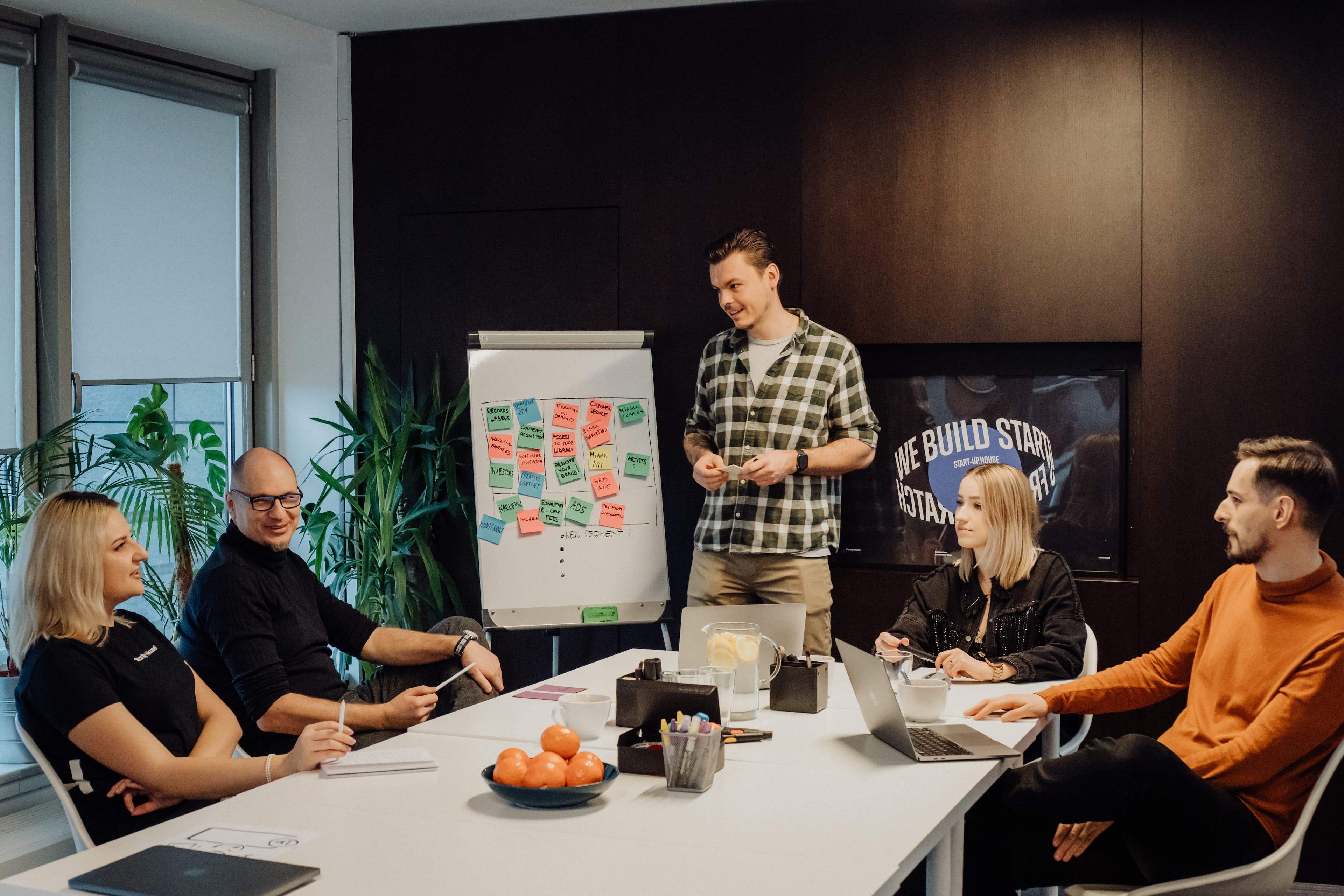The Future of Automotive: How Software Development is Driving Innovation
Marek Majdak
Dec 16, 2021・7 min read
Table of Content
Introduction to Automotive Software Development
The Significance of Software in Modern Vehicles
How Software has Transformed the Automotive Industry
Advancements in Automotive Software Applications
Evolution of Software Development for Automotive
The Past: How it All Began
The Present: Current Trends and Innovations
The Future: Predicted Advances in Automotive Software
Integrating Software Development into Automotive Design
Role of Software Developers in Vehicle Manufacturing
The Intersection of Automotive and IT Industries
Impact of Software Development on Automotive Business Models
Revolutionizing Business Models through Automotive Software
Adapting Dynamics: How Traditional Automotive Companies Embrace Software Evolution
Driving Transformation: Startup Innovations in Automotive Software
Conclusion: The Future of Automotive through Software Development
Emerging Technology Trends
Aligning Business Strategies with Software Innovations
The Role of Startups in Shaping the Future of Automotive
FAQs
Software development has become a driving force in the automotive industry, shaping the future of transportation and revolutionizing the way we interact with our vehicles. From the integration of smart features to the development of autonomous driving technologies, software plays a crucial role in enhancing the safety, efficiency, and overall experience of automobiles. In this document, we will explore the exciting world of software development for automotive, delving into the latest trends, innovations, and advancements in this rapidly evolving field. From cutting-edge infotainment systems to sophisticated driver-assistance technologies, we will uncover how automotive software development process is fueling innovation and shaping the future of the automotive industry. Join us on this journey as we discover the limitless potential of software in transforming the way we drive.
Introduction to Automotive Software Development
The Significance of Software in Modern Vehicles
In the contemporary automotive landscape, software has taken center stage, transforming vehicles into sophisticated machines akin to smartphones on wheels. The shift goes beyond traditional considerations like horsepower or design, with software emerging as the driving force behind automotive innovation. The significance of software development in vehicles is evident in various features:
- Connectivity: Modern cars are equipped with advanced connectivity features, allowing them to communicate with other vehicles, infrastructure, and even smartphones.
- Infotainment: Infotainment systems offer a plethora of functionalities, including navigation, media streaming, and seamless integration with smartphones and cloud services.
- Advanced Driver Assistance Systems (ADAS): Software powers safety features like automatic braking, lane-keeping assist, and adaptive cruise control, elevating the driving experience and improving road safety.
Moreover, the ability to update vehicle software over time enhances performance and introduces new features, contributing to the longevity of the vehicle.
How Software has Transformed the Automotive Industry
Software's transformative influence on the automotive industry extends beyond the vehicle itself, reshaping the entire landscape. Noteworthy shifts include:
- Intelligent Systems: Cars have evolved into intelligent systems capable of self-diagnosis and even autonomous driving, powered by sophisticated software applications.
- Electric Vehicles (EVs): The rise of EVs emphasizes the need for intricate software to manage battery efficiency and integrate seamlessly with the power grid.
- Value Proposition: The value of a car is now heavily influenced by its embedded software, marking a departure from the traditional emphasis on mechanical components.
This transformation has not only attracted traditional automakers but has also invited tech companies into the automotive space, fostering an environment of innovation.
Advancements in Automotive Software Applications
Delving into the realm of automotive software development reveals remarkable advancements that redefine the capabilities of vehicles. Notable progress includes:
- Infotainment Evolution: Infotainment systems have evolved into multifaceted hubs, offering navigation, media streaming, and seamless connectivity with smartphones and cloud services.
- Over-the-Air (OTA) Updates: The advent of OTA updates enables manufacturers to remotely fix bugs and upgrade vehicle software, enhancing convenience and ensuring optimal performance.
- Autonomous Driving Technologies: The pursuit of autonomous driving is pushing the boundaries of technology, with vehicles inching closer to achieving fully self-driving capabilities.
- Integration of AI and Machine Learning: Artificial intelligence and machine learning are making cars smarter, enabling them to learn from driver behavior and road conditions, thus improving overall performance and safety.
These advancements underscore the pivotal role of software development in creating vehicles that transcend mere transportation, evolving into intelligent companions on the road.
Evolution of Software Development for Automotive
The Past: How it All Began
The origins of software development for automotive trace back to the 1980s when simple on-board diagnostics systems emerged. Initially focused on monitoring the engine and managing fuel injection, these systems marked the initial foray into integrating software for vehicle enhancement. The 1990s introduced the first navigation systems, laying the foundation for software as a tool for driver assistance. The early 2000s witnessed the advent of connectivity and early infotainment systems, signaling a transformative era for the automotive industry. These modest beginnings proved pivotal, catalyzing a shift where software evolved from being a mere feature to a core component, ushering in a new era of innovation and competition.
The Present: Current Trends and Innovations
The contemporary automotive landscape is witnessing an unprecedented surge in software-driven innovation. Electric vehicles, with their intricate battery management systems, exemplify the centrality of software. Connectivity has become a hallmark, with vehicles joining the Internet of Things, fostering communication between cars, infrastructure, and pedestrians. This connectivity forms the backbone for the rapid evolution of autonomous driving, progressing from assisted features to full automation. Infotainment systems mirror smartphone functionalities, while data analytics and big data contribute to enhanced vehicle performance, predictive maintenance, and improved user experience. The current software development landscape for automotive systems reflects a harmonious synergy between automotive engineering and information technology, giving rise to vehicles that are smarter, safer, and more efficient.
The Future: Predicted Advances in Automotive Software
The future of automotive software promises exciting possibilities. Vehicles will seamlessly communicate with smart city infrastructures, optimizing traffic flow and enhancing safety. Autonomy will evolve to enable cars to navigate complex urban environments without human intervention. Software will facilitate a shift to subscription-based models for car features, allowing users to customize options like heated seats or enhanced horsepower on-demand. Advanced predictive maintenance and diagnostic software, powered by AI, will analyze vehicle data to prevent breakdowns proactively. The integration of augmented reality into heads-up displays will offer drivers valuable information without distraction. In summary, the anticipated advances in automotive software are poised to make driving more personalized, convenient, and safe, fundamentally reshaping our relationship with vehicles.
Integrating Software Development into Automotive Design
Role of Software Developers in Vehicle Manufacturing
Software developers have assumed crucial roles in vehicle manufacturing, extending beyond traditional software engineering. Their involvement spans the entire vehicle design and development process, collaborating with mechanical and electrical engineers to seamlessly integrate software and hardware. As vehicles evolve into sophisticated computers on wheels, developers write code for diverse systems, from engine control units to driver assistance features. Their responsibilities extend beyond coding, encompassing the reimagination of the driving experience, contributing to safety and sustainability, and staying abreast of rapid technological advancements.
- Collaboration with mechanical and electrical engineers
- Writing code for various vehicle systems
- Addressing usability and cybersecurity concerns
- Reimagining the driving experience
The Intersection of Automotive and IT Industries
The convergence of the automotive and IT industries has resulted in collaborations between traditional automakers and tech entities. This intersection has birthed new roles and specializations, with automotive software engineers engaged in telematics, artificial intelligence, and user interface design. The synergy between these sectors is fostering innovation in creating intuitive systems that minimize distraction. The result is vehicles equipped with advanced digital cockpits and voice-activated controls, meeting consumer expectations for connectivity and smart features.
- Collaboration between traditional automakers and tech entities
- Emergence of new roles and specializations
- Innovation in user interface design
- Focus on intuitive systems and connectivity
- Challenges and Opportunities for Software Developers in Automotive
Software developers in the automotive industry encounter unique challenges while navigating the convergence of two complex fields. Challenges include ensuring the reliability and safety of vehicle systems, addressing security concerns in connected vehicles, and meeting the demand for sophisticated in-car software. These challenges, however, present opportunities for innovation and growth, creating new career paths for developers skilled in AI, machine learning, and cybersecurity. The shift towards autonomous driving technology and the rise of electric vehicles contribute to a dynamic environment where developers can apply their skills to shape the future of mobility.
- Ensuring reliability and safety of vehicle systems
- Addressing cybersecurity concerns for connected vehicles
- Meeting the demand for sophisticated in-car software
- Opportunities for innovation and growth in AI, machine learning, and cybersecurity
Impact of Software Development on Automotive Business Models
Revolutionizing Business Models through Automotive Software
The impact of software development on automotive business models is nothing short of transformative, ushering in a new era of marketing, servicing, and utilizing vehicles.
- The innovative 'vehicle as a platform' concept envisions cars going beyond traditional transportation, offering an array of services like Wi-Fi hotspots, entertainment, and e-commerce opportunities.
- Subscription-based models, reminiscent of software usage on devices, are gaining momentum, granting users the power to tailor their driving experiences to unprecedented levels.
- 'Pay-as-you-drive' insurance, another groundbreaking model, utilizes sophisticated software to dynamically adjust rates based on monitored driving habits.
These revolutionary shifts, propelled by advanced software systems, not only provide consumers with unparalleled flexibility and personalization but also open novel revenue streams for manufacturers and service providers, marking a profound paradigm shift in the automotive industry.
Adapting Dynamics: How Traditional Automotive Companies Embrace Software Evolution
Traditional automotive companies are proactively adapting to the software revolution to maintain their competitive edge in the evolving automotive landscape.
- Transitioning from traditional manufacturers into comprehensive mobility service providers, these companies are integrating sophisticated software solutions to augment vehicle connectivity and overall user experience.
- Investments in robust digital platforms enable the introduction of innovative services such as car sharing and ride-hailing, ensuring that traditional automakers are not just keeping pace with innovation but leading the way.
- Strategic collaborations with tech firms and the establishment of in-house software development teams contribute to fostering innovation and accelerating the pace of digital transformation.
This paradigm shift allows traditional automakers not only to adapt but also to redefine their roles, transitioning from hardware-centric entities to developing software-driven businesses that offer a broader spectrum of transportation solutions.
Driving Transformation: Startup Innovations in Automotive Software
Startups are at the forefront of spearheading innovation in automotive software, serving as catalysts for transformative change within the industry.
- Leveraging their inherent agility and fresh perspectives, startups play a crucial role in developing disruptive technologies and innovative business models.
- Many startups specialize in niche areas such as advanced driver-assistance systems, electric vehicle battery management, and autonomous vehicle algorithms.
- Beyond technological contributions, these startups are redefining the entire customer experience, offering solutions that are more personalized, interactive, and attuned to modern expectations.
By leveraging the latest developments in automotive software development, startups can iterate rapidly and respond in real-time to dynamic market demands. This surge in innovation not only attracts significant investment but also fosters collaborative efforts with established automotive companies, ultimately accelerating the ongoing digital transformation within the automotive sector.
Conclusion: The Future of Automotive through Software Development
Emerging Technology Trends
The future of automotive is being shaped by several emerging technology trends, largely driven by software development. We are witnessing an increase in the integration of voice and gesture controls, providing drivers with more intuitive ways to interact with their vehicles. Connectivity is expanding with the advancement of vehicle-to-everything (V2X) communication, which allows cars to interact with their environment for improved safety and traffic management. Artificial intelligence is becoming more sophisticated, enabling predictive analytics for maintenance and personalized driver experiences. Electrification of vehicles continues to grow, supported by automotive software solutions that optimizes battery life and integrates with smart grids. Finally, we are moving towards fully autonomous vehicles, with advanced software capable of handling complex driving scenarios. These trends underscore the crucial role of software in driving innovation and ensuring the automotive industry continues to evolve and meet the future needs of drivers around the world.
Aligning Business Strategies with Software Innovations
As the automotive industry continues to evolve, aligning business strategies with the software technology innovations is becoming increasingly crucial. Automotive companies must consider software development as a core part of their strategy, rather than a supplementary feature. This means investing in talent and technologies that drive software advancement, such as AI and data analytics. It also means embracing a culture of continuous learning and adaptation to keep up with the rapid pace of technology change. Companies that can successfully integrate software innovations into their business models will benefit from new revenue streams, improved customer loyalty, and a stronger competitive position. In addition, by focusing on delivering software-driven value, automakers can differentiate themselves and redefine their brand in the eyes of the consumer. The key to future success in the automotive industry will be the ability to seamlessly blend automotive engineering with cutting-edge software development practices.
The Role of Startups in Shaping the Future of Automotive
Startups play an essential role in driving the future of automotive, particularly through their innovative approaches to the software development processes. Being smaller and more agile, startups can experiment and adapt quickly, pushing the boundaries of what's possible in automotive technology. They often lead the way in areas such as autonomous driving, electric vehicle technologies, and connected car systems, introducing fresh ideas and solutions to the market. Their role extends to influencing customer expectations, as they set new standards for vehicle functionality and user experience. By challenging the status quo, startups force traditional automakers to accelerate their innovation cycles and adopt more flexible business models. Collaborations between startups and established companies are likely to increase, combining the innovation and speed of the former with the scale and experience of the latter. This dynamic ecosystem of startups and traditional automotive companies ensures a competitive and vibrant market, driving the industry forward into a new era of mobility.
 FAQs
FAQs
Why is software development crucial in the automotive industry?
Software development is critical in the automotive industry as it facilitates the incorporation of advanced technologies like Artificial Intelligence (AI), Internet of Things (IoT), and autonomous driving. This integration enhances various aspects of vehicles, including safety features, operational efficiency, and overall user experience. The ability to continuously update and improve software ensures that vehicles remain at the forefront of technological advancements, meeting the evolving expectations of consumers.
How is software transforming the automotive industry?
Software is transforming the automotive industry by introducing smart features that enhance the driving experience. Over-the-air updates enable seamless improvements to vehicle functionality, while autonomous driving capabilities and improved connectivity between vehicles and their environment redefine the concept of transportation. Software-driven advancements contribute to making vehicles safer, more efficient, and capable of adapting to changing user preferences through continuous technological evolution.
What are the latest trends in automotive software development?
The latest trends in automotive software development encompass the rise of electric vehicles (EVs), leveraging AI and machine learning for predictive maintenance, integrating augmented reality into navigation systems, and progressing towards fully autonomous vehicles. These trends reflect the industry's commitment to sustainability, enhanced user experiences, and the seamless integration of cutting-edge technologies to redefine the future of transportation.
What opportunities does software development present for startups in the automotive sector?
Software development offers startups in the automotive sector opportunities to innovate in niche areas such as electric vehicle (EV) battery management, driver assistance technologies, and connected car services. These innovations often lead to partnerships with established automakers, fostering a collaborative environment where startups play a pivotal role in driving technological advancements and shaping the future of the automotive industry.
How can traditional automotive companies adapt to the software-driven future?
Traditional automotive companies can adapt to the software-driven future by investing in comprehensive digital transformation strategies. Forming strategic partnerships with technology companies and startups allows them to harness external expertise and stay at the forefront of innovation. Embracing agile software development methodologies ensures flexibility in adapting to rapidly evolving technologies, while prioritizing customer-centric digital solutions positions traditional automakers to meet the changing demands of consumers in a software-driven automotive landscape.
What challenges do software developers face in the automotive industry?
Software developers in the automotive industry encounter challenges such as ensuring the reliability and safety of complex software systems, protecting against cybersecurity threats, integrating software with legacy hardware components, and keeping pace with the rapid advancements in technology. Overcoming these challenges requires a combination of robust testing practices, collaboration with cybersecurity experts, seamless integration strategies, and a commitment to continuous learning and adaptation in the dynamic automotive software development environment.
What role do startups play in shaping the future of automotive?
Startups play a crucial role in shaping the future of the automotive industry by driving innovation, particularly in emerging technologies like autonomous driving and connected car systems. Their agility and fresh perspectives challenge traditional automakers to accelerate their own innovation efforts, leading to a dynamic and competitive industry landscape. Startups often act as catalysts for change, pushing boundaries, and introducing novel solutions that contribute to the ongoing transformation of the automotive sector.
Digital Transformation Strategy for Siemens Finance
Cloud-based platform for Siemens Financial Services in Poland


You may also like...

Top Traits of an Outstanding Software Development Team
The success of any software project depends on the team. See the top traits that turn good dev teams into outstanding ones.
Alexander Stasiak
Apr 18, 2025・12 min read

Choosing the Right Software Development Partner: A Practical Guide for Startups
The right software development partner can define your startup’s success. This guide shows how to choose one that fits your goals and needs.
Alexander Stasiak
Dec 30, 2024・10 min read

Understanding Event-Driven Programming: A Simple Guide for Everyone
Explore the essentials of event-driven programming. Learn how this responsive paradigm powers interactive applications with real-world examples and key concepts.
Marek Pałys
Apr 30, 2024・9 min read




